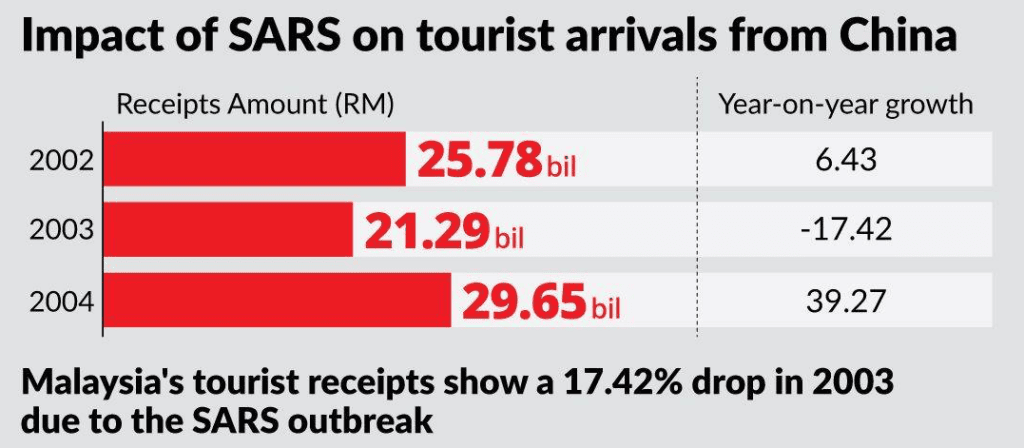Lessons for the travel industry from the SARS outbreak
The UN World Tourism Organization (UNWTO) predicts that international tourist arrivals may fall by 20-30% in 2020 due unprecedented travel restrictions in light of Covid-19. Travel contributes 10% of the world’s GDP, which makes this number too high for governments across the world to ignore. However, this isn’t the first time the industry is going through this cycle. The SARS outbreak in 2003 also had a significant impact on the airlines and tourism industries. And there are lessons the travel industry can use today.
The UNWTO has recently launched a call for action for the travel industry’s recovery from Covid-19. They might even lobby the governments to get certain recovery measures in place. Experts claim that the impact on travel businesses is projected to remain for a minimum of 10 months to a maximum of 24 months. Small & medium travel businesses will be worst hit.
So what about SARS?
SARS was first detected in November 2002, and it ended in July 2003 when the WHO declared the outbreak contained globally. That was after it killed more than 700 people with over 8,000 infected in 29 countries. Non-essential services resumed work and consumers returned to their previous consumption habits quickly. Disruption in economic activity during the SARS outbreak was strong but limited in duration, dragging down China’s growth from 11% y-o-y in Q1 2003 to 9% in the following quarter.
The scale was clearly much lower than Covid-19 but the airline and tourism industries suffered enormously. Airlines in the Asia-Pacific region lost 8% of annual RPKs (Revenue Passenger Kilometers) and $6 billion of revenues. Overall, there was a loss of $7 billion for airlines globally due to loss of confidence and fears of global spread.

To combat the negative impact of SARS, the industry stakeholders such as hotels, airlines and travel agencies had to adopt the following strategies:
1. Marketing and promotional strategies
Hotels realized that creating client confidence in trying times was very critical. For this, customers were informed that their health was paramount. And that they were taking extra measures at the hotel premises in terms of sanitisation. They fully refunded cancellations and allowed changes free of cost.
Hotels also resorted to digital marketing with a focus on revenue drivers such as meta search and retargeting. In other words, approaching prospective customers who visit the website directly and have plans of travel in the near future. Digital marketing was not as ubiquitous in 2003 and these steps helped the industry gradually transition to digital. They adopted promotional strategies such as complimentary food and stay packages.
Most of the hotels offered lower rates for their high-yield corporate clients, for a short period in order to encourage their clients to travel during those months immediately following the outbreak.
The airline industry offered discounts and special promotions to passengers, which resulted in 90% capacity utilization nearly 6 months after the outbreak.
2. Reducing operational costs
The hospitality industry focused on reducing operational costs. They reduced employee hours, asked employees to take unpaid leave, and in some cases even made employees redundant. Some top-tier hotels allowed employees to decide on days of unpaid leave based on their financial circumstances.
Upscale hotels also closed guest room floors, reduced number of lifts and escalators being used. In addition, they postponed renovations and canceled major projects to curtail costs.
The airline industry also asked employees to take a few weeks of unpaid leave, stopped unprofitable routes, renegotiated contracts and delivery times with aircraft lessors.
3. Client relationships
The importance of maintaining good relationships during the tough times is key to creating and maintaining trust for future business. Companies made courtesy calls or sent e-mails or flowers to frequent travelers and occupants at hotels. A few agencies provided relevant SARS information to clients. For example, up to date information about the outbreak, places affected and places that are safe to visit on the website. They also advised them about special packages and promotions.
Cathay Pacific placed newspaper advertisements in which they pledged to do everything needed to safeguard passengers.
4. Lookout for new markets
Participants explored non-traditional markets. For instance, promotional packages for local residents during the months of April and May 2003, immediately following the outbreak. This was in line with the government’s proposal of developing domestic tourism as a way of reviving the economy. Another strategy that was adopted was tie-ups with local tour operators by offering accommodation or meals for tourists. The airline industry responded by discovering and adding new profitable routes in order to create new revenue streams.
5. Pivoting the business model
The hotel industry began offering new services such as office cleaning to generate extra revenue and to keep their staff productive. Also, some hotels turned guest rooms into temporary offices and rented these to corporate clients, thus helping organizations work remotely with people in different locations and thus reducing the spread of the disease.
To conclude, the SARS outbreak served some harsh lessons to the travel industry but had a silver lining after all. The travel industry faced a temporary lull but slowly started to recover with new and creative strategies being employed, some of which are the norm today.
Smart digital marketing strategies, optimal cost structures, better hygiene and cleanliness had become the norm during the crisis and have stayed post the crisis as well.
The industry undoubtedly needs to brace for a hit worse than SARS. But, slowly and steadily, the travel industry must use the lessons of SARS to emerge on the other side of Covid-19.
Need assistance on operational challenges in face of a changing business environment? Reach out to us, the foremost management & business consultants in Hyderabad.